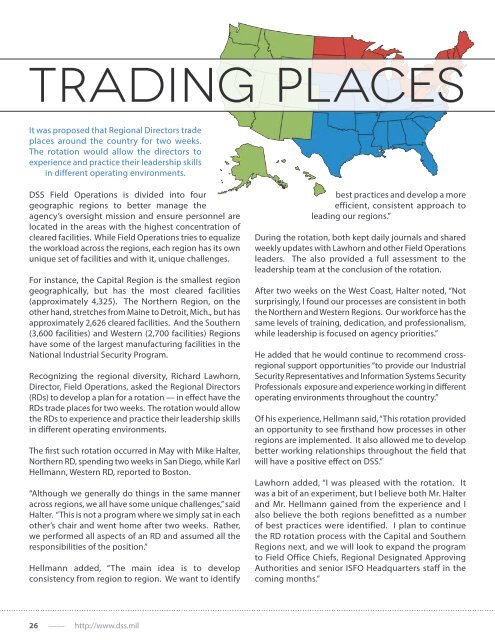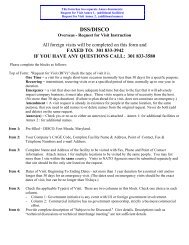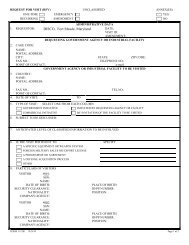DSS ACCESS, Volume 1, Issue 3 - Defense Security Service (DSS)
DSS ACCESS, Volume 1, Issue 3 - Defense Security Service (DSS)
DSS ACCESS, Volume 1, Issue 3 - Defense Security Service (DSS)
You also want an ePaper? Increase the reach of your titles
YUMPU automatically turns print PDFs into web optimized ePapers that Google loves.
Trading Places<br />
It was proposed that Regional Directors trade<br />
places around the country for two weeks.<br />
The rotation would allow the directors to<br />
experience and practice their leadership skills<br />
in different operating environments.<br />
<strong>DSS</strong> Field Operations is divided into four<br />
geographic regions to better manage the<br />
agency’s oversight mission and ensure personnel are<br />
located in the areas with the highest concentration of<br />
cleared facilities. While Field Operations tries to equalize<br />
the workload across the regions, each region has its own<br />
unique set of facilities and with it, unique challenges.<br />
For instance, the Capital Region is the smallest region<br />
geographically, but has the most cleared facilities<br />
(approximately 4,325). The Northern Region, on the<br />
other hand, stretches from Maine to Detroit, Mich., but has<br />
approximately 2,626 cleared facilities. And the Southern<br />
(3,600 facilities) and Western (2,700 facilities) Regions<br />
have some of the largest manufacturing facilities in the<br />
National Industrial <strong>Security</strong> Program.<br />
Recognizing the regional diversity, Richard Lawhorn,<br />
Director, Field Operations, asked the Regional Directors<br />
(RDs) to develop a plan for a rotation — in effect have the<br />
RDs trade places for two weeks. The rotation would allow<br />
the RDs to experience and practice their leadership skills<br />
in different operating environments.<br />
The first such rotation occurred in May with Mike Halter,<br />
Northern RD, spending two weeks in San Diego, while Karl<br />
Hellmann, Western RD, reported to Boston.<br />
“Although we generally do things in the same manner<br />
across regions, we all have some unique challenges,” said<br />
Halter. “This is not a program where we simply sat in each<br />
other’s chair and went home after two weeks. Rather,<br />
we performed all aspects of an RD and assumed all the<br />
responsibilities of the position.”<br />
Hellmann added, “The main idea is to develop<br />
consistency from region to region. We want to identify<br />
26 —— http://www.dss.mil<br />
best practices and develop a more<br />
efficient, consistent approach to<br />
leading our regions.”<br />
During the rotation, both kept daily journals and shared<br />
weekly updates with Lawhorn and other Field Operations<br />
leaders. The also provided a full assessment to the<br />
leadership team at the conclusion of the rotation.<br />
After two weeks on the West Coast, Halter noted, “Not<br />
surprisingly, I found our processes are consistent in both<br />
the Northern and Western Regions. Our workforce has the<br />
same levels of training, dedication, and professionalism,<br />
while leadership is focused on agency priorities.”<br />
He added that he would continue to recommend crossregional<br />
support opportunities “to provide our Industrial<br />
<strong>Security</strong> Representatives and Information Systems <strong>Security</strong><br />
Professionals exposure and experience working in different<br />
operating environments throughout the country.”<br />
Of his experience, Hellmann said, “This rotation provided<br />
an opportunity to see firsthand how processes in other<br />
regions are implemented. It also allowed me to develop<br />
better working relationships throughout the field that<br />
will have a positive effect on <strong>DSS</strong>.”<br />
Lawhorn added, “I was pleased with the rotation. It<br />
was a bit of an experiment, but I believe both Mr. Halter<br />
and Mr. Hellmann gained from the experience and I<br />
also believe the both regions benefitted as a number<br />
of best practices were identified. I plan to continue<br />
the RD rotation process with the Capital and Southern<br />
Regions next, and we will look to expand the program<br />
to Field Office Chiefs, Regional Designated Approving<br />
Authorities and senior ISFO Headquarters staff in the<br />
coming months.”




